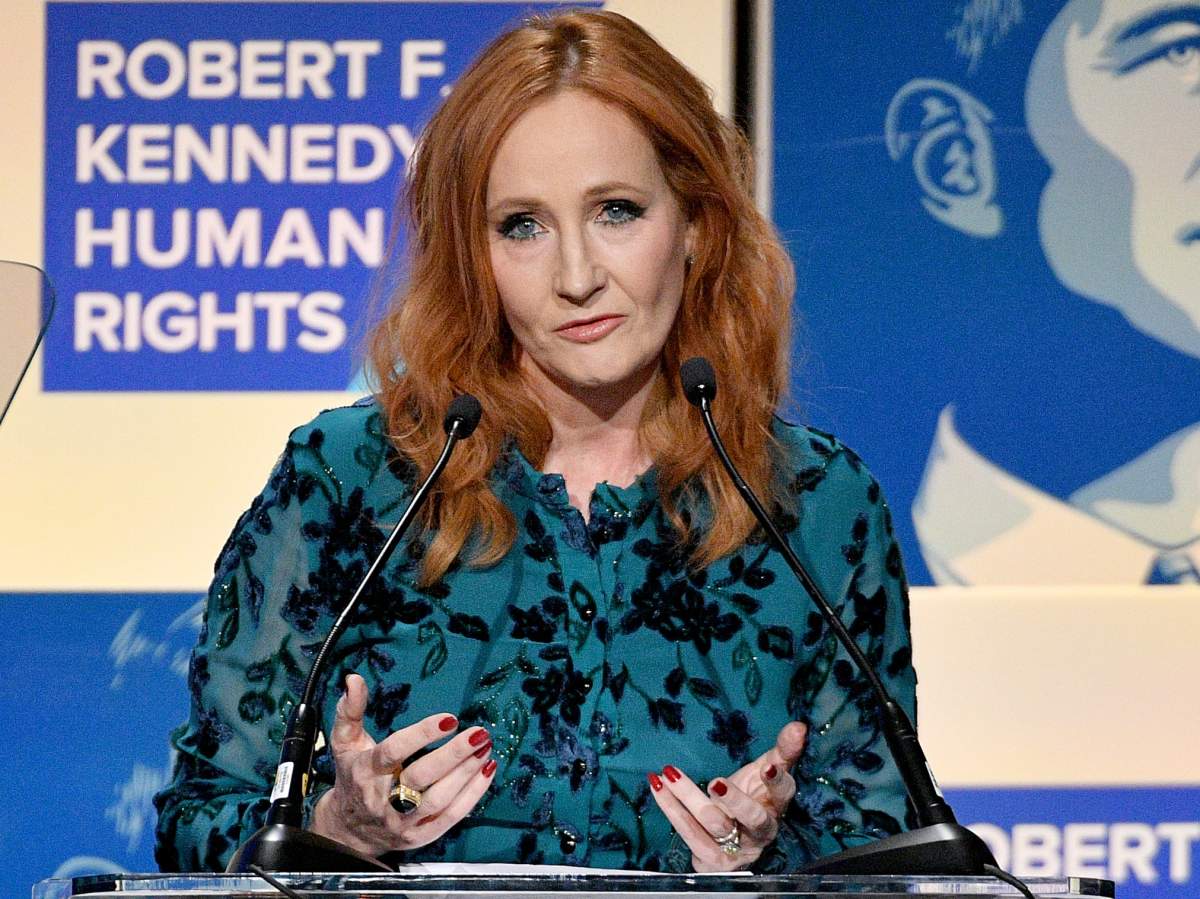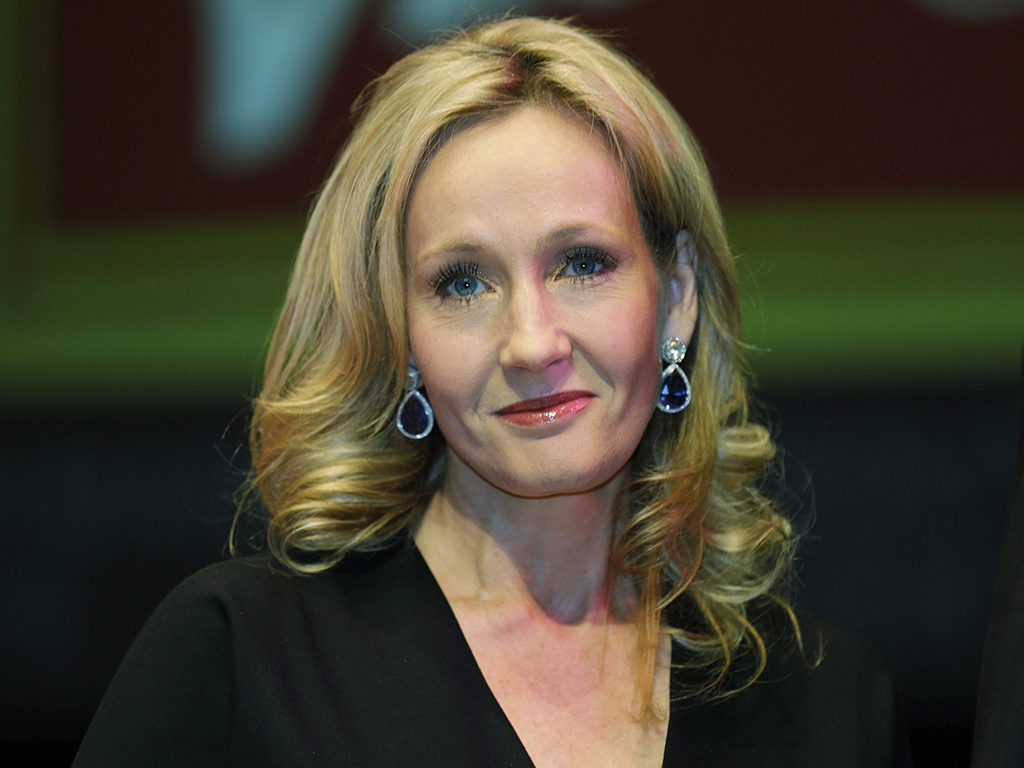Though she never really left the spotlight after making transphobic remarks via Twitter last month, J.K. Rowling has, yet again, become the subject of widespread criticism after calling transgender hormone therapy a “new kind of conversion therapy for young gay people.”

The Harry Potter author took to Twitter on July 5, saying “health professionals are concerned” that youth struggling with mental health issues are being “shunted towards” transgender hormone therapy and/or surgery when it “may not be in their best interests.”
Rowling, 54, also tweeted that people who are prescribed and use hormone medications are “being set on a lifelong path of medicalization that may result in the loss of their fertility and/or full sexual function.”
Rowling’s comments came in response to Twitter user @TrinerScot, who accused the world-famous author of liking a tweet that described hormone prescriptions as the “new anti-depressants” and claimed that they were “lazy” and should be a “last resort” for transgender people.
The tweet in question reads: “Yes they are sometimes necessary and life-saving, but they should be a last resort — not the first option. Pure laziness for those who would rather medicate than put in the time and effort to heal people’s minds.”
The tweet was “beyond offensive,” @TrinerScot wrote.
“Who had money on J.K. Rowling pivoting to supporting those who call people who take mental health medication ‘lazy?'” wrote @TrinerScot on July 4. “I take daily medication to function, this sentiment is beyond offensive, it is actively harmful to millions.”
Despite claiming she’s “ignored porn tweeted at children on a thread about their art” and “ignored death and rape threats,” Rowling seemingly drew the line at @TrinerScot’s tweet.
“I’m not going to ignore this,” she wrote in her first response to @TrinerScot on Saturday.
“When you lie about what I believe about mental health medication and when you misrepresent the views of a trans woman for whom I feel nothing but admiration and solidarity, you cross a line.”
Referring to the recent and highly controversial article (“TERF Wars”) she penned in defence of her “offensive” and “dismissive” transphobic remarks last month, Rowling implied that she wasn’t inexperienced in the subject of taking medication as she had already “written and spoken about (her) own mental health challenges.”
“I’ve taken anti-depressants in the past and they helped me,” she tweeted, before saying that hormone or surgery therapies “may” be the answer for select transgender people, but not “for others.”
In that same 3,800-word article, Rowling also doubled down on her transphobic comments and expanded on them by sharing her concerns about “new trans activism.” She became the subject of mass criticism.
In wake of Saturday’s tweets, thousands of users took to the social media platform airing their grievances with the British novelist for comparing hormone therapy and surgery to conversion therapy, saying things like she should not be speaking “negatively” about something she “has no right in talking about,” among other things.

Get daily National news
Actor Jameela Jamil condemned Rowling, describing her tweets as “fear mongering” for “transitioning,” before sharing a link to a medical surgeon who explains the process of surgical transitioning to the 34-year-old.
Here’s what some other Twitter users had to say:
Conversion therapy is a “dangerous and discredited practice aimed at changing an individual’s sexual orientation or gender identity,” according to U.S.-based suicide prevention hotline for LGBTQ2 youth the Trevor Project.
The method utilizes various shaming, emotionally traumatic or physically painful stimuli to make victims associate the pain with their sexual identity, as reported by the foundation, which is also publicly endorsed by Harry Potter film star Daniel Radcliffe.

Initially, Rowling was subject to major backlash on June 6 after firing off a tweet in which she bristled at the headline of an opinion piece published by Devex, which reads: “Creating a more equal post-COVID-19 world for people who menstruate.”
“’People who menstruate,’” the Gloucestershire-born novelist tweeted in response. “I’m sure there used to be a word for those people. Someone help me out. Wumben? Wimpund? Woomud?”
Rowling has made repeated comments in the past conflating sex and gender.
According to the Canadian Institutes of Health Research, sex is based on biological attributes such as physical and physiological features, including chromosomes and reproductive organs, while gender “refers to the socially constructed roles, behaviours, expressions and identities of girls, women, boys, men and gender-diverse people.”

Following the widespread criticism, Rowling tried to explain to her fans that she never intended to offend the trans community. In followup Twitter posts, however, she continued to repeat that biological “sex is real.”
“If sex isn’t real, there’s no same-sex attraction,” she wrote shortly after her initial tweet. “If sex isn’t real, the lived reality of women globally is erased.
As a result of those transphobic comments — and many more — two of the most popular Harry Potter fan websites are now publicly distancing themselves from Rowling.









Comments
Want to discuss? Please read our Commenting Policy first.